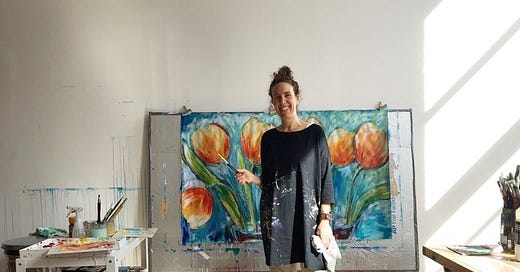Some years ago, when I was going through a hard time, my friend Emily reached out to tell me how, every evening, she emailed her friends with a list of three good things that had happened that day—and her friends did the same. She invited me to join them. She said it could help.
At the time I couldn’t see this for the gift that it was. I feared it would be another thing to worry about—and to feel bad about when I forgot. I was touched by the gesture, but I feared my inevitable failure.
And, actually, I was wrong. This truly was a thing that could have helped me.
This thing Emily does is now a regular newsletter—a practice, a community—and I understand the wisdom behind it in a way I couldn’t back then. It’s a simple practice, but one that can be profound and life changing as well. Deceptively simple, I would say.
And Emily—who is an artist and a creator, among her many talents—recently sat down and chatted with me about how she got started—how her practice is meeting this moment—and all that she has learned along the way. This felt like such a special conversation, I hope you enjoy it.
And, for paid subscribers, we decided to release the audio recording of our talk. This was not something we planned—but the details are so good (and too many of them did not make the edit cut). So here is a simple and unguarded conversation (lightly condensed/edited for clarity) between friends about the things of life, both great and small.
How did you get started doing Three Good Things?
I started practicing 10 years ago, in the summer of 2015. My kids were at camp and I got a call from the director saying Lucy fell and we're going to take her for an X-ray. Turns out she had a broken tibia, a spiral fracture, and had to be ambulanced to Boston. They put her to sleep, put her leg back together, and she ended up in a cast from the top of her thigh to the tip of her toe.
And it was three months before her bat mitzvah, and then my grandmother died, and I was just in a state of despair. I went to see a friend who is a rabbi and I said, “I don't know how to celebrate.” Here was this milestone in our family's life, and I didn't want to go into it in this state of despair.
And my friend said, “When we have opportunities to celebrate, we are obligated to celebrate, because that's how we balance the scales in the world. We have to bring the joy in places where we can.”
So, I wrote my friends and I said, “I'm going to send you an email every night with a list of three good things from the day. All you have to do is receive it, but I need to send it.”
They all said they would write too. So we started emailing each other every evening.
And I was like: How could this make a difference? I'm already a pretty grateful person, this isn't really going to matter. But it did, and my mindset shifted, and my friends’ mindsets shifted. So then, all of a sudden, it wasn't just me noticing. It was this exchange of good things. Each of us were suddenly noticing more.
In the spring of 2023, a friend said, “You should start an Instagram account for this.” So I did, and I was doing that for six months. And I ultimately moved it to Substack.
After the election, I thought: This is something I can offer to the world right now.
In a time where I don't know what to do, I don't know how to solve the world's problems. I don't know how to fight against a political climate that is the antithesis of what I believe. But I do know that that it is critical that we don't lose sight of hope, and we don't lose sight of beauty, and those two things are inextricably related.
So, I started talking about it, and more people joined, and then I took a leap and I posted about it on a Facebook page for a podcast. They started talking about it, and then it has snowballed from there.
This thing I've been doing for 10 years is the thing I can offer at this time. And it is super resonating. [Editorial note: there are now 13,000+ participants.]
I have never looked at the comments until this past week, and I was just blown away. What an amazing community.
Right? Somebody wrote to me and said, “My granddaughter is having a baby, and I'm going to be a great grandmother.” And somebody else said, “I just picked up my prom dress.”
Somebody wrote to say, “I got a massage.” And somebody writes and says, “I had enough money to cover the rent.” It’s all these things.
And somebody's commenting on their sobriety, and somebody's commenting on their loneliness. People are wishing each other happy birthday and congratulating each other and consoling each other and giving each other advice about breakups.
And people are so different. Last week, I had this moment where I thought: Am I going to say that I'm preparing for the Passover holiday? Am I comfortable putting that out there in this climate?
And I decided that this is who I am, so I'm not going to hide who I am.
And I did say it, and there are people who reference Jesus in their comments and use crosses and other kinds of Christian imagery or language. And those folks were so welcoming and wishing me a happy holiday, and I was wishing them a meaningful observance [for Palm Sunday]. And it just had this feeling of our ability to come together.
Now, I’m talking about a very small slice of the population, right, but I don't know anybody who isn't overwhelmed or burned out or feeling the chaos—whether it's from the political climate or from people suffering in their own lives or in their own families, illnesses and challenges and job challenges and financial challenges. I don't know anybody who isn't feeling that that sort of the challenges of being alive in 2025, and I recognize that. And also there is still good
Rabbi David Wolpe says something like, Beauty dies in the absence of hope. And I say, yes, and hope dies in the absence of beauty.
We have to keep the good things in our vision, in our sight lines, in order to keep our hope alive.
And the things that are hard are taking up space unapologetically—there is no shortage of shouting about the hard things. The good things are often quieter, and we have to take responsibility for amplifying that for ourselves and for each other.
I don't know if you have read about glimmers, but I was really struck by the fact that—it's based on the work of Dr. Stephen Porges and Polyvagal theory—but the glimmer aspect came from someone [Deb Dana] who works with trauma victims.
And it's not about denying the bad, because you simply can't—when someone has experienced real harm, there's no getting around that. But it is this very subtle shift where you are not gaslighting on the negative aspects of life. And yet, there are also these lovely moments—or the flowers that you see on your walk.
I always remember my friend Karen Walrond, who started a gratitude practice when she was going through a difficult period of life. At the end of each day she would note a few good things. But she said one day the thing she could come up with was: Someone held the door for me when I went into that building.
Yes, yes—so I want to say two things. One is that I like to draw a distinction between this practice and gratitude. They're cousins, for sure—and one can lead to the other.
I think gratitude, practicing gratitude, can be intimidating for people, because it feels like you have to generate a feeling. And when you're in a difficult time, it can be really hard to generate that feeling.
This practice is not asking you to feel anything. It's asking you to notice something that's good. Name it, say it out loud, take a picture, write it down, text a friend—so that you give it substance outside of your own awareness, and then share it so that, in doing so, you shine a light for other people to be able to see good things as well.
So, it is related to gratitude, but I think for a lot of folks, it's really, really hard to generate gratitude, or imagine gratitude, or feel a sense of gratitude, especially right now. I would say also—and you'll tell me if you think that this is offensive to say, because I don't in any way need to diminish Capital-T trauma—but I do think we are a society living in Lowercase-T trauma.
Oh, absolutely.
And so we all do need that in this time.
When people say I can't or it's too hard, I tell them: make it smaller. Make it smaller. Make it smaller. The air going in and out of my lungs, right? Like, my heart is beating. I woke up this morning. These are good things that we overlook, because they're quiet, because they're in the background, you know? And yet they are not, they're not small. They are deserving of our attention and our energy.
For a long time I felt discomfort about this practice and I had a hard time talking about it in some settings, because I wanted to be really clear about how it's not toxic positivity, and it's not meant to gaslight, right?
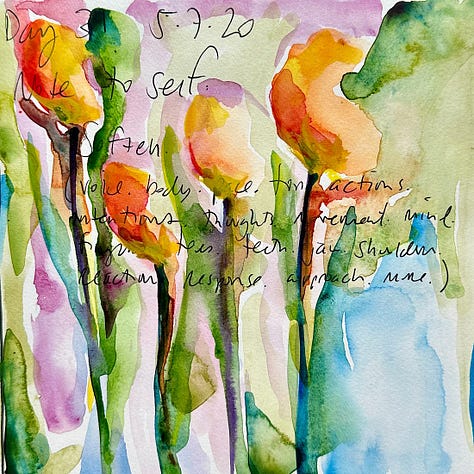
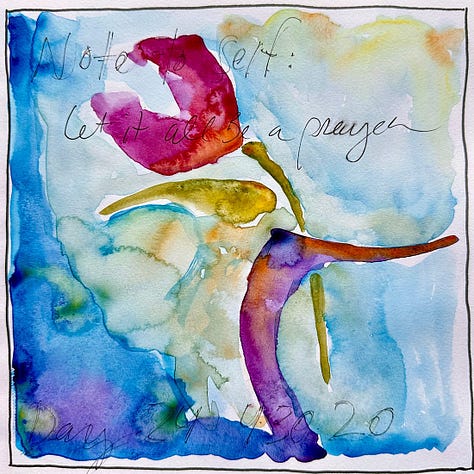
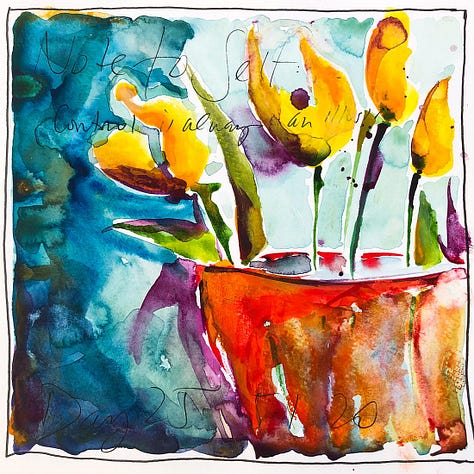
So I say all the time: this is not instead of the hard things. This is not to deny the hard things or pretend the hard things aren't there. This is because of the hard things. We all have hard things, individually, collectively, communally, societally, and we need this in order to be able to live side by side with those hard things, or to integrate those hard things into our lives.
If we don't, if we aren't attentive to the balance on the seesaw, it will tip into a vortex of despair, right? Like it will be very easy to do that. Nobody else is balancing that scale for us. We have to do it for ourselves and for each other.
I was 12 weeks pregnant when my father died, so at the funeral home I'm in the receiving line, and people are coming through and they're saying, I'm so sorry and congratulations.
Like I'm holding life and death in the palm of my hand side by side, seeing it in such stark contrast—or, actually, not contrast and compliment. It's both.
That year my father was sick and died—he was sick for a long time, but in that period right before he died—my grandparents came to visit from overseas three times. And I was like, if there's time and money to do that when someone's dying, then we better make sure there's time and money to do that when we're alive.
We don't know what we have besides this moment, this day—and yes, we need to fight against the evils among us, right? We need to use our voices and our actions to try to make the world a better place. And we need to enjoy and appreciate the things that we have in the moment when we have them.
I think that this is a lesson that becomes clearer and more poignant as you get older. There's a quote I heard once, and I've never been able to track it down exactly. I think it's a misinterpretation of a Confucius quote. But the way that I heard it, and the way I remember it, is that your life begins twice: the first time on the day that you are born, and the second beginning is the day that you realize—truly realize—that you are going to die.
This is what my painting is about, my flight deck is about this. It's all about bringing light into our awareness and the power of perspective and the ability to see.
When I was 25, my father died, my maternal grandmother had a massive stroke, and then I gave birth to my son. All those things happened in the span of six months—and then I had two friends my age die, and my aunt died, and my grandfather died, all in the next five-six years.
And I feel like, what set me on this course is that I saw by the age of 26 that nothing is promised. There is no longevity that is promised to me—and, if I'm being honest with you, I didn’t think I would live to 52.
So that was part of it too. Like, I've been keeping my work just quiet over here in the corner, but I am here, and I do have the privilege of sharing something, and if I'm keeping it secret, then I'm not really fulfilling that purpose.
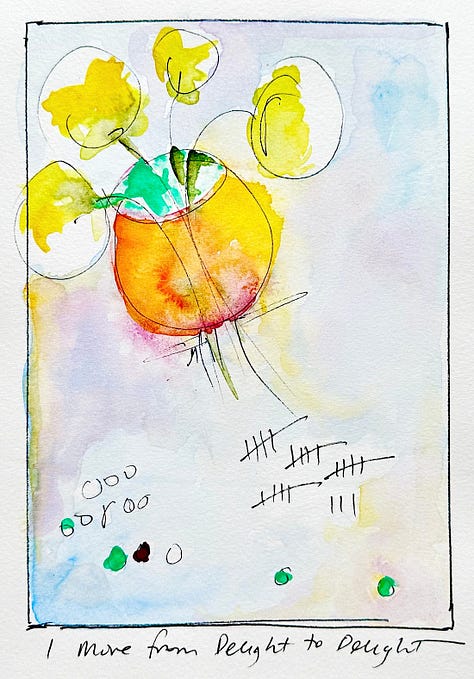
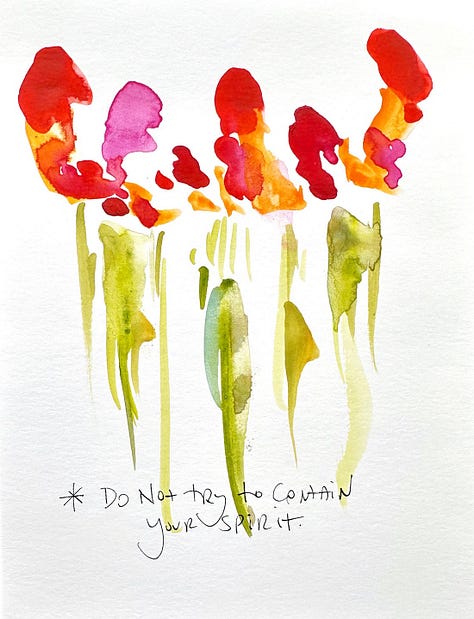
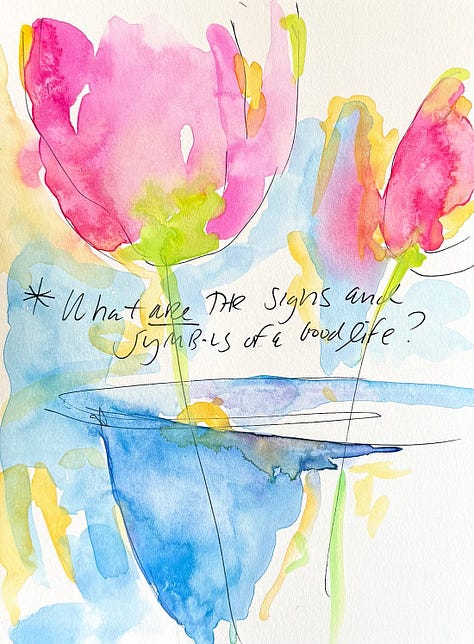
My mom lost her mother when she was three years old. She died in childbirth with my mom's younger sister at the age of 29. And I think my mom always sort of assumed she would die at 29, too. She didn’t have children until after she turned 30.
Yes, I was scared for a long time to turn 52—and now I feel like I'm going to embrace this. I don't know what else there will be, but yes, I have to embrace this time in my life. [Ed note: Emily turned 52 two days after we spoke.]
Yes, and the truth is we really should be embracing it all the time. We just don't know it until we know it.
And even once we know it, it's very easy to forget—I mean, we have to forget. How would we be able to carry that nugget of truth with us? It would be like carrying the most delicate bird's egg in the palm of your hand while you were trying to cook dinner and do the laundry. We can't really do the things that we do in our lives if we're holding that in the forefront, we have to set that down.
I was once told that there is a quote that you can find with very similar wording in both the Bible and the Quran, and it says something along the lines of: In the afterlife, you will be asked to justify any pleasure you were allowed on earth that you did not take advantage of.
I don’t know if it’s true, but I love the idea that the both of these wisdom traditions or religions had something very similar. And I like the spirit behind it—there are beautiful things on earth that you have the ability to experience, and why are you not?
That's what that my Rabbi friend was saying—exactly what you're saying. If you have an opportunity for celebration, you're obligated to celebrate. That's how we balance the scales.
I'm going to now say something that I believe—and I don't say it a lot because it sounds really woo-woo. You know, in our society, we worship violence: war movies, violent video games, right? We worship that destruction and heroism combination. So, is it surprising that we then create that level of destruction?
What I would say is: if we want more goodness, we have to call more goodness in. That we're obligated to celebrate, that we're obligated to enjoy the pleasure that was available to us. This is an act of calling that vision of the world into creation, into being.
And I believe that this practice rewires your brain. I believe it makes it possible to live with hard things. I believe it creates community and brings people together and we help each other. And also, I believe that it is part of bringing into being a world that I want to live in.
Thank you so much, Emily! Audio version is below for paid subscribers, who help keep the lights on around here (thank you!). You can find more of Emily, and all the beautiful things she creates, at her newsletter Tell Me 3 Good Things and also on her website.
On the other site: the first post I ever wrote, in honor of Mother’s Day, I think this is how we shift things, how we make the sort of world we need. Three years later, this is even more important now than it was then. What Will It Take?

